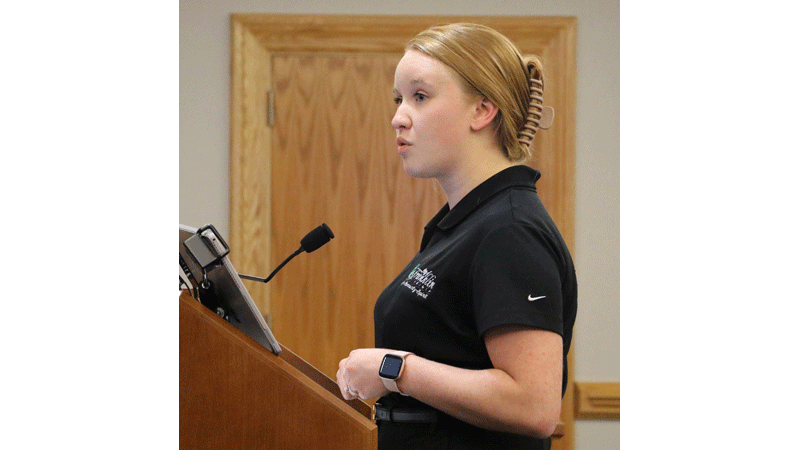Franklin City Council adopts food truck ordinance
Published 6:54 pm Monday, September 18, 2023
|
Getting your Trinity Audio player ready...
|
Franklin City Council voted 6-0 on Aug. 28 to adopt an ordinance containing regulations that allow for the operation of 12 mobile food units within Franklin’s city limits over the course of a year.
The vote on the ordinance followed a public hearing in which four people spoke. All were in favor of food trucks in the city, and two were food truck owners/operators.
Mayor Robert “Bobby” Cutchins abstained from voting on the ordinance, noting it was because he owns a restaurant in the city.
“But I am in favor,” he said as the vote concluded, later adding, “Congratulations to all the food truck people.”
Franklin Director of Community Development Carlee Gurskiy noted that former community development staff had developed and presented an initial ordinance in August 2019, but planning commissioners and council members decided to table the vote on the ordinance at that time.
Since then, interest has increased significantly surrounding the operation of food trucks in the city, and the ordinance was sent back to the Planning Commission. Gurskiy presented that ordinance to the council Aug. 28 with amendments suggested by the commission, and she went over the highlights of the amended ordinance during the meeting.
THE DEFINITION OF A MOBILE FOOD UNIT
“One of the first amendments to this is that the former ordinance did not use the state definition of a mobile food unit, and so this ordinance adopts the state’s definition,” she said.
The definition reads as follows: “A restaurant that is mounted on wheels and readily moveable from place to place at all times during operation.”
HOW A FOOD TRUCK GETS A LICENSE TO OPERATE IN FRANKLIN
Gurskiy noted that the second highlight in the amendment is that there has been some language that has been added to provide regulation as to how a mobile food unit would go about getting a license to be able to operate within Franklin.
“They will need to first report to the commissioner of revenue,” she said. “There, they will register their business through their customer registration number, and they will also be required to obtain a business license.
“The first item on a checklist for a business license is your zoning clearance,” she continued. “So they would then come to community development where they would submit an application, and with that application, we would require that they submit a site plan to demonstrate where they anticipate setting up their unit, along with property owner permission. They must have property owner permission to be able to set up their unit.
“And they must prove that they have been approved by the health department and satisfy the state requirements of the fire code,” she added. “And that can be done either through our office, through our building official, he could do an inspection, or they may choose to ask the state fire marshal to do an inspection.
“So all of these things are required in order for a mobile food unit to operate within the city,” she said.
THE NUMBER OF UNITS ALLOWED PER YEAR
Gurskiy said the planning commissioners suggested that the city should limit the number of operational mobile food units to 12 per year.
“That customer registration number that I mentioned in the beginning, that number will be used to track the number of mobile food units that operate within the city,” she said.
OTHER KEY REGULATIONS
Gurskiy highlighted a few other regulations that mobile food units must abide by when they are setting up within the city, according to the proposed ordinance.
“Unless otherwise approved, mobile food units shall operate only on developed and occupied property within the business and industrial zoning districts,” she stated. “That was already in the text, and with feedback from planning commissioners, they will cease operations by 9 p.m., excluding events on private property where residents host food units as the catering vendor.
“There was a lot of discussion with the planning commissioners of, ‘Well, what if I have a wedding reception or a graduation party or a birthday party? Does this not allow me to hire a food unit as the caterer?’” Gurskiy added. “So we’ve explicitly added language that excludes those events so that you are able to do so.”
She also noted that the proposed ordinance stated that “mobile food units shall be parked at least 100 feet away from any residential dwelling.”
“Again, it’s important to include it the first time, so we included it the second time — it excludes events on private property where residents host food units as the catering vendor,” she said.
Lastly, she said, “Unless otherwise approved, mobile food units shall not be parked in or operated from a public street of right of way. So, again, they must be on developed, occupied private property with the property owner’s permission in order to set up for sale.”
QUESTIONS FROM THE COUNCIL
Ward 4 Councilman Dr. Linwood Johnson started off what became an extended discussion regarding the number of food trucks that the ordinance should allow within the city.
“Why only 12 trucks per year when we have a land-mass city of 8.5 miles?” he asked. “Why just 12?”
Gurskiy said, “This text allows us to get started and provide some regulation as to how to operate. And so if we don’t like the 12 or we want to increase or decrease the 12, that’s always an option.”
Johnson favored starting with 24.
Cutchins said, “We’re trying to find a happy ground to start on to see if we can control it and maintain it and everything is going to be followed through proper. In the studies that I did personally, most larger cities will regulate one food truck per thousand people, which 12 is not that either, it’s way over. But we’re just trying to find a happy place to start and increase, and if it doesn’t work, it’ll have to be done away with, or grow it forward, hopefully.”
Ward 2 Councilman Ray Smith said he thought the ordinance was relatively good, but he thought 12 units was too many for a city the size of Franklin, and he favored eight.
During the public hearing, Samantha Urquhart, a Southampton County resident and local food truck owner, said she thought 12 seemed a bit excessive.
“I think eight is a good number,” she said.
Another food truck representative spoke after Urquhart and said she thought 12 trucks was not enough for Franklin.
Ward 3 Councilman Gregory McLemore said he did not think 12 was a bad number because he did not think they would all be operating in the city at the same time.
“Why do we have to restrict it only to 12 if they’re not all operating at the same time?” he asked.
Overall, he expressed frustration with the amount of restrictions upon food truck owners found within the proposed ordinance.
“I am for more freedom of operation for the food trucks,” he said.
He later noted that there had been discussion about making eight of the 12 allowed-for mobile food units being for new businesses, and four of the 12 units being reserved for existing restaurants to utilize food trucks if they so choose.
Ward 6 Councilwoman Jessica G. Banks later noted that the eight and four breakdown was her suggestion.
Johnson said, “I’d like to be fair to entrepreneurs. We have a city that’s open for business. If you just have 12, then like Councilman McLemore said, it cuts out a lot more people.”
Banks said, “Someone has to monitor the taxes and someone has to monitor the food trucks, making sure that they’re compliant. That’s why I was in favor of the number 12 and no more, no less at this moment.”
She said that the city can see how the ordinance works with 12, collecting the data from the experience.
“I think 12 is a good number,” she said.
Johnson said, “I understand that, but why not just start out with 24 and monitor that?”
“Who’s going to monitor it?” Banks asked.
“Exactly,” Ward 1 Councilman Mark R. Kitchen said.
Johnson later asked for information purposes, “Who’s going to monitor the food trucks?”
Cutchins said, “There is really no one to monitor the food trucks because it’s after hours. We’re not going to pay staff overtime to go around and monitor. That’s why we wanted to start with a reasonable number and make sure it was controllable and workable.”
For those pushing for a greater number of food trucks in the ordinance, Banks questioned where so many food trucks would find places in the city.
“In my opinion, you start small and you expand,” she said. “If it comes, it comes. But where are they going to go? Name 24 properties right now that would be willing to allow food trucks to be on their property.”
Kitchen stated that the Franklin Police Department is too taxed to be chasing down complaints on food trucks, and city staff could not provide enforcement on the weekends.
“We have to start first on setting guidelines because we’re going to have a problem enforcing it, and a rule with no enforcement is nothing, absolutely nothing,” he said.
McLemore said he could live with 12 units being listed in the ordinance, and Johnson agreed.
Then Smith made a motion to adopt the proposed ordinance for 12 units, as it was written.
The city of Franklin posted on its Facebook page on Monday, Sept. 11, that the 12 spots are available on a first come, first serve basis.
Those interested in filling a spot are encouraged to contact the Commissioner of the Revenue Office at 757-562-8547 to complete the permit application. Permit applications may also be picked up between 8:30 a.m. and 5 p.m. Monday-Friday at 207 W. 2nd Ave. in Franklin.







